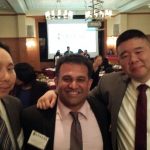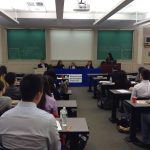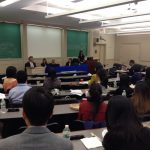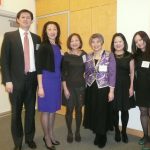School of Law – Asian Pacific American Law Students Association 2015 Lunar New Year Dinner | St. John’s University
Asian Pacific American Law Students Association 2015 Lunar New Year Dinner
March 6, 2015, 6pm-11pm
Open to Alumni
Registration Required
Cost: $70+
Join us for the Asian Pacific American Law Students Association 2015 Lunar New Year Dinner honoring Lisa Chun ‘00, Executive Vice President, Paulsen & Co. Open to alumni, students, friends, and family!
Where: Vermilion, 480 Lexington Ave, New York. NY 10017
Two Options to choose from:
Option 1:
- 3 Course Meal
- Open Bar & Hors d’oeuvres
- From 6pm-11pm
- Students: $70 per person
- All Others: $75 per person
- At the Door: $80 per person
Option 2:
- Reception Only (1 hour open bar & Hors d’oeuvres)
- From 6pm-7pm
- $40 per person
To attend the event, please complete and return the reply card by February 24, 2015.
More Information: Kevin Wong ’16 | [email protected] or Christina Nguyen ’16 | christinama[email protected]
Asian American Bar Association & New York Law School Host CLE Program Focused on Confronting Poverty in the Asian Pacific American Community on Nov. 18, 7pm
FOR IMMEDIATE RELEASE
November 18, 2014
Contact: Yang Chen, Executive Director, (718) 228-7206
Nancy Guida, (212) 431-2872
NEW YORK – November 18, 2014 – The Asian American Bar Association of New York (AABANY), the Racial Justice Project of the Impact Center for Public Interest Law at New York Law School (NYLS), and the Asian Pacific American Law Students Association at NYLS are hosting a Continuing Legal Education (CLE) program, “Shattering the Model Minority Myth: Asian Pacific Americans Facing Poverty in New York City” at New York Law School. The program will take place on November 18, 2014 from 7:00 PM to 8:30 PM at 185 West Broadway, New York, NY 10013 in Room W401. A reception with light refreshments will precede the program.
Although Asian-/Pacific-Americans (APAs) have often been portrayed as well assimilated, “well off,” and successful, and considered a “model minority,” in reality many APAs experience significant socio-economic challenges. This CLE program and discussion forum will address the changing demographics and needs of the burgeoning APA population in New York City, as well as policies affecting the APA community’s access to language assistance and governmental benefits and services. The program will also present legal tools and resources to enable law school students and members of the bar to offer pro bono or low-cost legal assistance to low or fixed-income members of this community.
The program will be moderated by Karen Kithan Yau, Esq., Co-chair of AABANY’s Government Service and Public Interest Committee (GSPIC). Speakers include Wei Hu, Esq., Deputy Director of Policy and Research, Family Independence Administration (FIA), NYC Human Resources Administration / Department of Social Services (HRA); Hon. Lydia C. Lai, J.H.C., Kings County Housing Court Judge; Kavita Pawria-Sanchez, Esq., Assistant Commissioner, NYC Mayor’s Office for Immigrant Affairs; and Grace Shim, Executive Director of MinKwon Center for Community Action. This program will offer a total of 1.5 credits (both transitional and non-transitional).
The exciting collaboration between AABANY and NYLS aims to bring under-addressed issues to law students and the larger legal community, and to engage members of the bar in meaningful pro bono work.
_
For more information, please contact Yang Chen, AABANY Executive Director, at (718) 228-7206, or direct any inquiries to [email protected], or contact Nancy Guida at (212) 431-2872.
About New York Law School
Founded in 1891, New York Law School (NYLS) is an independent law school located in the heart of New York City’s legal, government, financial, and emerging tech centers. Known as “New York’s law school,” NYLS embraces the City as its classroom by complementing a rigorous legal education with an innovative and diverse set of “uniquely New York” experiential learning opportunities. Since opening our doors nearly 125 years ago, we have produced graduates who have gone on to hold high elected and appointed office in the City, lead large and small firms, and gain broad recognition as captains of business and industry. Our renowned faculty of prolific scholars has built the School’s strength in such areas as constitutional law, civil and human rights, business and finance law, media and information law, tax law, real estate, and a number of interdisciplinary fields. NYLS has more than 17,000 graduates and currently enrolls approximately 1,000 full-time and part-time students in its J.D. program. The Law School also offers advanced-degree programs in American Business Law and Tax Law. Learn more about New York’s law school at www.nyls.edu.
About AABANY
The Asian American Bar Association of New York is a professional membership organization of attorneys concerned with issues affecting the Asian Pacific American community. Incorporated in 1989, AABANY seeks not only to encourage the professional growth of its members but also to advocate for the Asian Pacific American community as a whole. AABANY is the New York regional affiliate of the National Asian Pacific American Bar Association (NAPABA).
###
Additional information about AABANY is available at www.aabany.org
Follow our blog at www.blog.aabany.org
Follow us on Twitter at www.twitter.com/aabany
Find us on Facebook at www.facebook.com/aabany
Find us on LinkedIn at www.linkedin.com/in/aabany
Law students seek posthumous admission of Chinese lawyer to California State Bar
Law students seek posthumous admission of Chinese lawyer to California State Bar
AABANY commends UC Davis’ Asian Pacific American Law Students Association (APALSA) and their efforts to posthumously admit Chinese lawyer Hong Yeng Chang to the California State Bar, who was denied admission in 1887. After New York State passed a private bill that waived the citizenship requirement, the New York Times reported that Hong Yeng Chang was the first Chinese immigrant admitted to any bar in the United States. To quote Angry Asian Man, “Chang’s admission to the state bar would be symbolic – a bold repudiation of the state’s discriminatory past.”
“Uncovering Talent: The Case of Asian Americans” – Lecture by Chief Justice Earl Warren Professor of Constitutional Law Kenji Yoshino
At the 14th Annual Korematsu Lecture Series, presented by the NYU Asian-Pacific American Law Students Association, Chief Justice Earl Warren Professor of Constitutional Law Kenji Yoshino spoke about the phenomenon of ‘covering,’ discussed at length in his first book, Covering: The Hidden Assault on Our Civil Rights. The Korematsu Lecture Series, since 2000, has recognized Asian Americans whose work challenges legal boundaries and serves as an inspiration to all people of color.
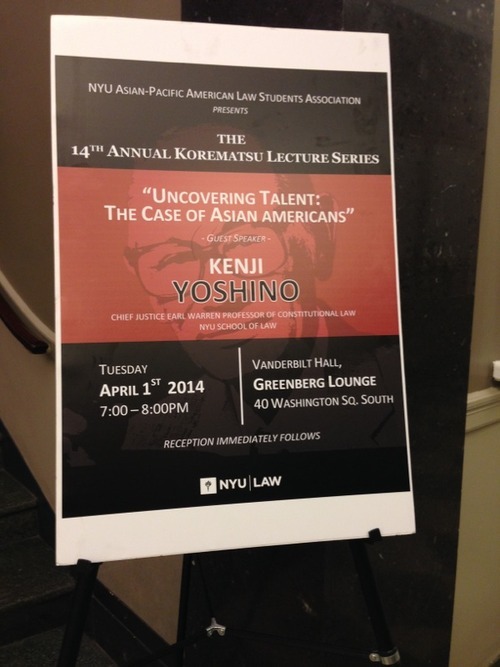
Professor Kenji Yoshino touched upon his extensive research regarding the frequency of incidence and perceived impact of covering. As opposed to “passing,” the practice of concealing a part of one’s identity in order to present as a member of the dominant major, “covering” differs in that a person who covers is unable to completely conceal that part of his or her identity so must instead downplay qualities associated with it. In Prof. Yoshino’s words, “covering” is a tax that minorities have to pay in response to a much less visible second-wave discrimination. Examining both the demand and the performance of covering, the research explores whether certain professional organizations live up to their stated values of inclusion. Asking the question of whether certain groups feel as though they must cover in order to be successful and have their successes attributed to their personal qualities rather than their race, Prof. Yoshino identified four kinds of covering: (1) appearance-based covering (e.g. a black woman straightens her hair to downplay her race), (2) affiliation-based covering that avoids behaviors associated with identity (e.g. a mother avoids talking about her children because she does not want her co-workers to believe she is less committed to work), (3) advocacy-based covering that determines how much a person ‘sticks up’ for their group (e.g. a veteran lets a military joke slide lest he or she be seen as strident), and (4) association-based covering (e.g. a gay man does not bring his partner to work functions so as not to be seen as ‘too gay’).
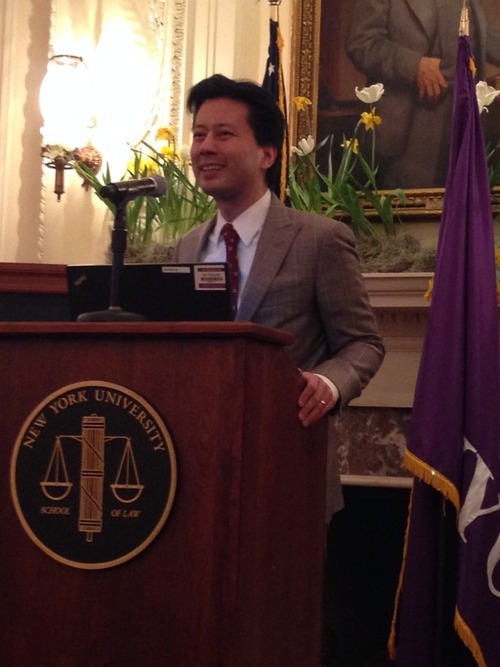
In many ways, Prof. Yoshino’s research brings together many groups who feel the need to cover their identity, including the often elevated or demonized straight white males who feel they have to cover other factors, such as their socioeconomic background or their veteran status. At the same time, his findings also reveal the differences in impact respectively felt by members of different groups. Whereas most people feel the impact of covering, racial groups feel the impact to a greater degree, with no one impacted more than women of color who must simultaneously play down both their gender and race.
Here are some of the ways you could say I am “white”:
I listen to National Public Radio.
I have few close friends “of color."
I furnish my condo a la Crate & Barrel.
I vacation in charming bed-and-breakfasts.
I have never once been the victim of blatant discrimination.
I am a member of several exclusive institutions.
I have been in the inner sanctums of political power.
I have been there as something other than an attendant.
I have the ambition to return.
I am a producer of the culture.
I expect my voice to be heard.
I speak flawless, unaccented English.
I subscribe to Foreign Affairs.
I do not mind when editorialists write in the first person plural.
I do not mind how white television casts are.
I am not too ethnic. I am wary of minority militants.
I consider myself neither in exile nor in opposition.
I am considered “a credit to my race.”– Eric Liu, The Accidental Asian: Notes of a Native Speaker
"The loudest duck gets shot,” laughed Prof. Yoshino. Underscoring a dark history of discrimination, Prof. Yoshino explained how Asian Americans occupy a liminal space in which they are seen both as “honorary whites” and perpetual foreigners. Asian Americans cover or reverse-cover in numerous ways, either feeling pressure to live up to the model minority myth or feeling pressure to perform and act in certain ways to emphasize their Asian American identity. Professional Asian women are the least likely to have children. Asian Americans cover on the issue of age, often engaging in behaviors like wearing glasses or dressing conservatively in order to appear older and more authoritative.
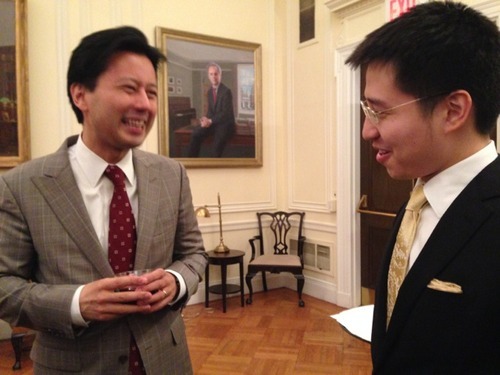
(Above: Prof. Kenji Yoshino and former student and AABANY member George Hang.)
“Covering” gives a name to the phenomenon, which gives a person the tools to self-diagnose and consciously uncover. What is called for now by Prof. Yoshino’s research is self-reflection within organizations and communities. Having leaders who do not have to downplay their identities works to dismantle the harmful associations which might lead a person of color, mother, or other marginalized person to cover.
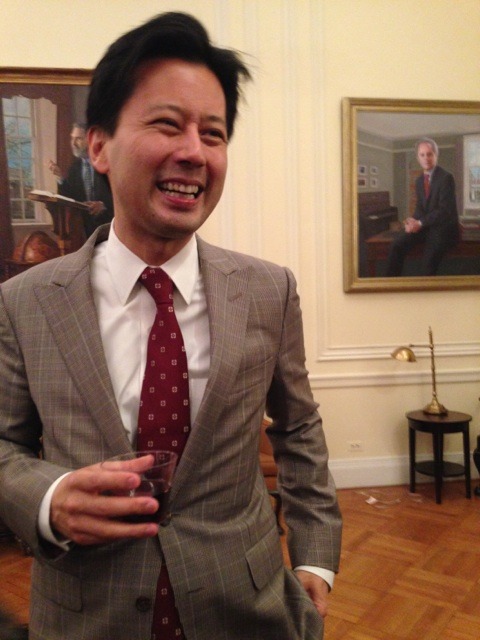
Prof. Yoshino closed with his own uncovering story: his own title, previously the “Earl Warren Professor of Constitutional Law” at NYU, had been a delicate issue in accepting his position. A Japanese American, Kenji Yoshino had been wary of taking on the title of the man who as Attorney General commissioned the internment of Japanese Americans during World War II. After much deliberation, the offer was again extended to Prof. Yoshino, appending the words “Chief Justice” – after the initial confusion, Prof. Yoshino learned that later in life as Chief Justice, Earl Warren had recanted and expressed his deep regret that he had ever done such a dishonorable action. In the spirit of the Chief Justice, Prof. Yoshino accepted the position – his research works to change perceptions and increase cultural awareness for the better, and that deeply matters, even over the course of one lifetime.
~
Special thanks to Prof. Kenji Yoshino, the NYU Asian Pacific American Law Students Association, and Hanah Kim and Ted Kim of the Korematsu Committee for continuing the tradition of education and inspiration!
AABANY Congratulates Rio Guerrero

AABANY congratulates Rio Guerrero, Founding Chair of AABANY’s Immigration and Nationality Law Committee, on recently being appointed to serve as a Co-Chair of the NAPABA Immigration Committee. Also, as a 1998 Brooklyn Law School alumni, Rio has been invited as a guest speaker for the April 4th APALSA 25th Annual Dinner at Brooklyn Law School.
AALDEF Young Professionals Committee & Cardozo APALSA Present: LINSANITY Screening & Filmmaker Q&A
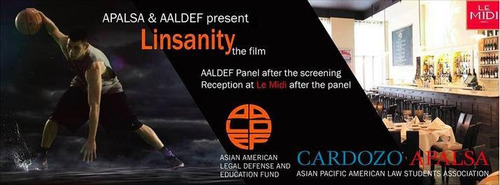
AALDEF Young Professionals Committee & Cardozo APALSA
LINSANITY Screening & Filmmaker Q&A
Tuesday, March 4, 2014
6:00 – 8:30 PM
Cardozo School of Law
55 Fifth Avenue (@12th St., Moot Court Room), NYC
$10 tickets
For more information: [email protected]
RSVP required by 3pm March 4th for all non-Cardozo students.
Following the panel, please join us for a post-screening party!
Happy hour specials all night.
Le Midi Bar & Restaurant
11 East 13th St. (btwn 5th Ave. & University Pl.)
AALDEF YPC and Cardozo APALSA present: “The documentary that began filming long before Linsanity became a pop culture reference. American’s favorite unlikely sports hero.” Please join us for an AALDEF 40th Anniversary presentation of the award-winning film LINSANITY followed by a special panel discussion with director Evan Jackson Leong and AALDEF Staff Attorney Thomas Mariadason. Donations to benefit AALDEF’s Educational Equity Program. Post-screening party with happy hour specials at Le Midi Bar & Restaurant, 11 East 13th Street (btw 5th Ave. and University Place). Can’t make it? You can still support AALDEF by clicking here to make a donation!
“Director Evan Jackson Leong embarked on this documentary before Jeremy Lin was a household name, following the future star as he struggled to find his place in a league where Asian American players are few and far between. More than just a film for basketball addicts, Linsanity serves as an insightful study of the way we perceive race in America and shows what is possible if someone believes in himself.” – Sundance
The Young Professionals Committee is dedicated to fostering the next generation of AALDEF supporters. Through social and networking events and other programming, the Young Professionals Committee aims to raise awareness about AALDEF’s wide range of efforts on behalf of the Asian American community.
Columbia APALSA Third Annual Conference: On the Shoulders of Giants
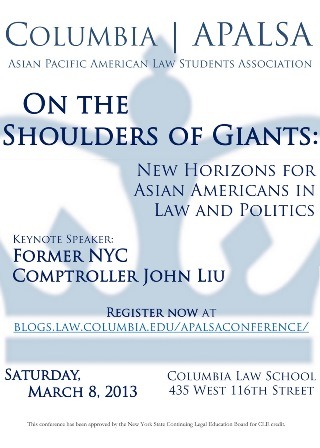
The Columbia Asian Pacific America Law Students Association invites you to attend their third annual conference: On the Shoulders of Giants: New Horizons for Asian Americans in Law and Politics. The conference will be held on Saturday, March 8 starting at 1pm. Attend one of three panels on Immigration Reform, Minority Identity, and Professional Development or attend dinner with keynote speaker former NYC Comptroller John Liu. Among the speakers at the conference will be AABANY President Mike Huang, President-Elect Clara Ohr and Board Member Karen Lim, who will be joining Helen Wan (author, The Partner Track) and Vivia Chen (blogger, The Careerist) on a panel entitled “Navigating the Career Ladder: Professional Development Strategies for Asian American Attorneys.”
CLE credit will be offered. Tickets are available on our
website at http://blogs.law.columbia.edu/apalsaconference/.


